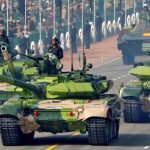In commemoration of seventy years to the diplomatic relations, the leadership of India and China have jointly agreed to designate 2020 as “Year of India-China Cultural and People to People Exchanges”.[1] As proposed in the event of the Second Informal Summit between Indian Prime Minister Narendra Modi and Chinese President Xi Jinping, the key objective lies in deepening exchanges at all levels including between their respective legislatures, political parties, cultural and youth organisations and militaries- as charted to be held under seventy activities.
What makes 70 years significant? The distinction lies in the way India-China relations have evolved since the relations were founded on 1 April 1950. Premised on the bedrock of the Panchsheel Principle, a look back does confirm that despite the growing differences both New Delhi and Beijing have succeeded in sustaining a peaceful co-existence. In view of which, the seventy years can be chalked under a timeline of phases, such as: 1950-1958 entailed the sloganeering phase of ‘Hindi-Chini Bhai Bhai’ to that of an open armed conflict in 1962; from a staggering deadlock until 1976 to that of a phase of restoration ties from 1976-1990s under two landmark visits Atal Bihari Vajpayee in 1976 and Rajiv Gandhi in 1988; to that of overcoming a setback caused by India’s nuclear tests in 1998 to that of forging into a “Strategic and Cooperative partnership in 2005 with a temporary fallout under Doklam standoff in 2017. To this tracing of a timeline, the most interesting phase is that of ‘now’ wherein, under the Modi-Xi nexus the relations have transcended to an informal level under “Wuhan to Chennai”- thus, setting new precedents by breaking old protocols.
From this prism, the future trajectory of India-China relations holds more than just uncertainties. Wherein, in dissolving the old barriers, at the foremost, the need lies in building trust and a parity in the perception. That is, India and China exist in parallels of twin perspectives based on their level of engagements. Wherein, at the international level, there is a partnership quotient dominated by the logic of common interest as witnessed in multilateral engagements such as BRICS, SCO, AIIB, Climate change, WTO and others. The deviant lies in the bilateral level; wherein, the disparity results from the competing interests complemented by mutual suspicion of each other’s intentions. What calls for this anathema despite the seven decades of diplomatic ties are mainly three factors- the dynamics of India-China relations is shaped by two key factors: first, the power disparity between the two countries; and second, an asymmetry in mutual perception and strategic distrust primarily drawn from the vestiges of the 1962 War and the unresolved territory and boundary dispute. Adding to the political frictions is the towering trade deficit that is gradually emerging into an issue of significant concern, mainly for India- further making the relations lopsided. This very factor then weighs down as well as nullifies the objective of Most Favoured Nation (MFN) status, as adopted in 1984. So, if the issue is timely tackled, it will prevent a difference from becoming a future dispute, as witnessed in case of US-China trade war. There remains an increasing risk of protectionist measures, which become far more significant given the absence of a bilateral free-trade agreement between India and China.
What India and China can do? At the foremost, the objective lies in dispelling the growing ambiguity over each other’s intentions. Adopting a policy of acting ‘principle in position and flexible in approach,’ India and China should build a consensus on the following:
First, New Delhi and Beijing should jointly acknowledge that the onus lies on both parties in order to pave a way forward. One party cannot take precedence over the other. Second, communication at all levels- political, diplomatic and military, should act as the principle mechanism in order to avoid the syndrome of ‘assumption of the worst’. Third, there has to be a synergy in bridging the engagement gap at international and bilateral level, and not treated as independent of the other. Fourth, reactive responses should be replaced by proactive measures to bridge the widening gap of trust deficit rather than otherwise. Fifth and most importantly, on the resolution of the border, the rhetoric and mindset of ‘next generation settlement’ should be discarded and rather concrete and timely steps should be adopted in delimiting, delineating, and demarcating the boundary in question. For as long as the boundary question remains unresolved, the likelihood of further tensions is always high, if not low. To which, a reluctant attitude only adds to spiraling the dilemma, which has only worsened with time.
This framework then provides the parameters to chalk the road map of seventy years hence. Given the rising profiles of India and China and their ability to make significant difference in the changing world order, there remains enough space for both actors to sustain the peaceful co-existence. All it needs is a consensus and more importantly, the conviction to act responsibly towards maintaining it. In view of this, the seventieth anniversary provides an opportune time for India and China to strengthen the ties by fostering more people-to-people exchanges. This will not only help bridge the perception gap but significantly add to the building of trust- paving a new path towards rebuilding the old relation.
References:
[1] Ministry of External Affairs, Government of India, “2nd India-China Informal Summit”, 12 October 2019, https://www.mea.gov.in/press-releases.htm?dtl/31938/2nd+IndiaChina+Informal+Summit, accessed online 03 December 2019.















